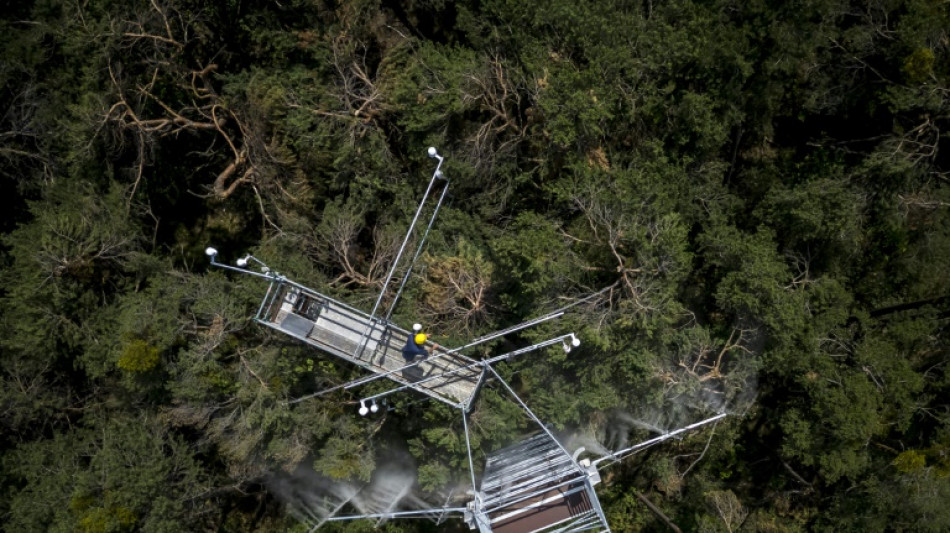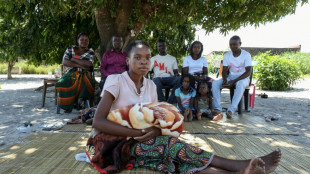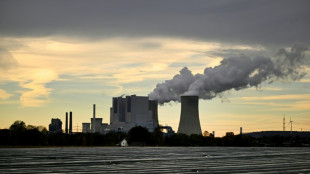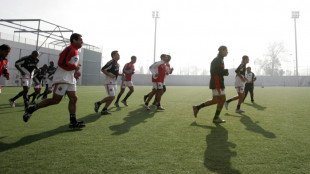
-
 'I wanted to die': survivors recount Mozambique flood terror
'I wanted to die': survivors recount Mozambique flood terror
-
Trump issues fierce warning to Minneapolis mayor over immigration

-
 Anglican church's first female leader confirmed at London service
Anglican church's first female leader confirmed at London service
-
Germany cuts growth forecast as recovery slower than hoped

-
 Amazon to cut 16,000 jobs worldwide
Amazon to cut 16,000 jobs worldwide
-
One dead, five injured in clashes between Colombia football fans

-
 Dollar halts descent, gold keeps climbing before Fed update
Dollar halts descent, gold keeps climbing before Fed update
-
US YouTuber IShowSpeed gains Ghanaian nationality at end of Africa tour

-
 Sweden plans to ban mobile phones in schools
Sweden plans to ban mobile phones in schools
-
Turkey football club faces probe over braids clip backing Syrian Kurds

-
 Deutsche Bank offices searched in money laundering probe
Deutsche Bank offices searched in money laundering probe
-
US embassy angers Danish veterans by removing flags

-
 Netherlands 'insufficiently' protects Caribbean island from climate change: court
Netherlands 'insufficiently' protects Caribbean island from climate change: court
-
Fury confirms April comeback fight against Makhmudov

-
 Susan Sarandon to be honoured at Spain's top film awards
Susan Sarandon to be honoured at Spain's top film awards
-
Trump says 'time running out' as Iran rejects talks amid 'threats'

-
 Spain eyes full service on train tragedy line in 10 days
Spain eyes full service on train tragedy line in 10 days
-
Greenland dispute 'strategic wake-up call for all of Europe,' says Macron

-
 'Intimidation and coercion': Iran pressuring families of killed protesters
'Intimidation and coercion': Iran pressuring families of killed protesters
-
Europe urged to 'step up' on defence as Trump upends ties

-
 Sinner hails 'inspiration' Djokovic ahead of Australian Open blockbuster
Sinner hails 'inspiration' Djokovic ahead of Australian Open blockbuster
-
Dollar rebounds while gold climbs again before Fed update

-
 Aki a doubt for Ireland's Six Nations opener over disciplinary issue
Aki a doubt for Ireland's Six Nations opener over disciplinary issue
-
West Ham sign Fulham winger Traore

-
 Relentless Sinner sets up Australian Open blockbuster with Djokovic
Relentless Sinner sets up Australian Open blockbuster with Djokovic
-
Israel prepares to bury last Gaza hostage

-
 Iran rejects talks with US amid military 'threats'
Iran rejects talks with US amid military 'threats'
-
Heart attack ends iconic French prop Atonio's career

-
 SKorean chip giant SK hynix posts record operating profit for 2025
SKorean chip giant SK hynix posts record operating profit for 2025
-
Greenland's elite dogsled unit patrols desolate, icy Arctic

-
 Dutch tech giant ASML posts bumper profits, cuts jobs
Dutch tech giant ASML posts bumper profits, cuts jobs
-
Musetti rues 'really painful' retirement after schooling Djokovic

-
 Russian volcano puts on display in latest eruption
Russian volcano puts on display in latest eruption
-
Thailand uses contraceptive vaccine to limit wild elephant births

-
 Djokovic gets lucky to join Pegula, Rybakina in Melbourne semi-finals
Djokovic gets lucky to join Pegula, Rybakina in Melbourne semi-finals
-
Trump says to 'de-escalate' Minneapolis, as aide questions agents' 'protocol'

-
 'Extremely lucky' Djokovic into Melbourne semi-finals as Musetti retires
'Extremely lucky' Djokovic into Melbourne semi-finals as Musetti retires
-
'Animals in a zoo': Players back Gauff call for more privacy

-
 Starmer heads to China to defend 'pragmatic' partnership
Starmer heads to China to defend 'pragmatic' partnership
-
Uganda's Quidditch players with global dreams

-
 'Hard to survive': Kyiv's elderly shiver after Russian attacks on power and heat
'Hard to survive': Kyiv's elderly shiver after Russian attacks on power and heat
-
South Korea's ex-first lady jailed for 20 months for taking bribes

-
 Polish migrants return home to a changed country
Polish migrants return home to a changed country
-
Dutch tech giant ASML posts bumper profits, eyes bright AI future

-
 South Korea's ex-first lady jailed for 20 months for corruption
South Korea's ex-first lady jailed for 20 months for corruption
-
Minnesota congresswoman unbowed after attacked with liquid

-
 Backlash as Australia kills dingoes after backpacker death
Backlash as Australia kills dingoes after backpacker death
-
Brazil declares acai a national fruit to ward off 'biopiracy'

-
 Anisimova 'loses her mind' after Melbourne quarter-final exit
Anisimova 'loses her mind' after Melbourne quarter-final exit
-
Home hope Goggia on medal mission at Milan-Cortina Winter Olympics


Facing climate change, Swiss trees get mist before they're missed
In a Swiss pine forest, the treetops are being sprayed with mist in a bid to discover the effect that drier or wetter air has on their ability to survive.
Eighteen scaffolding towers have been erected between the trees in the Pfynwald in Switzerland's southern Wallis region. High-pressure nozzles mounted on the towers spray vapour over the canopy of some 60 Scots pines, standing 15 metres (49 feet) tall.
The study is a unique experiment designed to separate out and analyse the different effects of soil drought and air dryness in a natural forest ecosystem.
"The goal is not to spray forests to save them, but to understand why a lack of water in the atmosphere has such a significant impact on forests," project director Charlotte Grossiord told AFP.
The trial is being conducted by the Swiss Federal Institute for Forest, Snow and Landscape Research (WSL) and the Swiss Federal Institute of Technology in Lausanne (EPFL).
The vapour studies aim to measure the rate of dieback in trees, where the leaves and branches start to wither away. It should help experts anticipate when similar forests will be affected, said Giovanni Bortolami, one of the researchers.
The objective is to develop forestry strategies and influence the choice of tree species to plant in future, as Switzerland experiences increasingly dry summers.
By 2060, there will be 25 percent less rain in the summer and droughts will generally last longer, the environment ministry has said.
Another goal is to better understand tree mortality, given that trees "allow us to estimate the concentration of carbon dioxide in the atmosphere", with CO2 being the main climate-warming greenhouse gas, said Grossiord, a professor of plant ecology.
- Thirsty air -
The Pfynwald is one of the biggest continuous Scots pine forests in Europe. It counts roughly a thousand trees, all around a century old.
At 615 metres (2,017 feet) above sea level, and surrounded by towering Alpine mountains in the Rhone river valley, the forest is one of the hottest and driest places in Switzerland -- ideal conditions for the researchers.
They have been working in the Pfynwald since 2003, studying the dieback of Scots pines due to soil dryness.
Some parts of the forest are irrigated, while in others, translucent plastic prevents rainwater from reaching the soil.
The mist-creating sprays were introduced last year to study the effects of air dryness, as climate change is resulting in another worrying environmental parameter: thirsty air.
At equal humidity, warm air is more "thirsty" than cold air. This "thirst" is called vapour pressure deficit (VPD).
VPD is a major factor in determining how much water trees will evaporate through their leaves. With global warming, VPD is increasing, which can cause water stress in vegetation.
"Imagine a glass of water in a desert and a glass of water in a rainforest. The temperature is the same. The glass of water empties very quickly in the desert, but not in the rainforest," said Bortolami.
It's "exactly the same for trees", which evaporate much more water if the air is drier and therefore "consume water from the soil more quickly", the plant ecophysiology researcher explained.
- Surprising results -
The nozzles diffuse water vapour onto part of the canopy during the day to reduce air "thirst" by about 20 to 30 percent.
The researchers then compare the data with the trees that did not get the water vapour spray.
Cables on the forest floor are hooked up to sensors on the tree trunks, which continuously measure their diameter and sap flow -- an indicator of water stress. The researchers take other monthly measurements on site.
The study will continue until 2028.
The initial results show that a lack of water in the soil speeds up the dieback of foliage -- an expected outcome for the researchers.
"However, we observed that a dry atmosphere will slow down the dieback process rather than speed it up. That's what really surprised us," said Grossiord.
The measurements revealed that with less moisture in the atmosphere, trees close their pores to conserve water.
But these acclimatisation mechanisms can only help a tree so much. In the Pfynwald, as in other dry Alpine valleys, Scots pines are dying out while young oak trees, some only waist high, are taking their place.
C.Koch--VB


